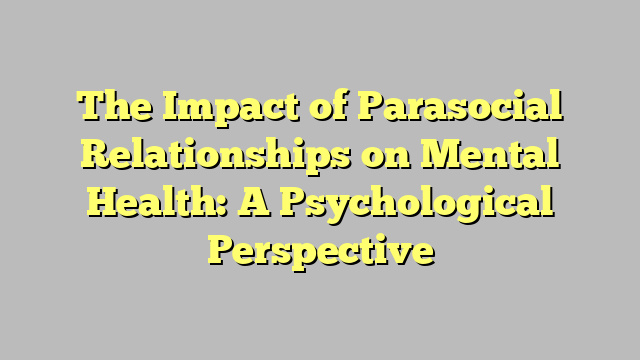The Impact of Parasocial Relationships on Mental Health: A Psychological Perspective
The Impact of Parasocial Relationships on Mental Health: A Psychological Perspective
Parasocial relationships, or one-sided relationships in which one person invests emotional energy, time, and interest in a media figure, have become increasingly prevalent in today’s society. With the rise of social media and celebrity culture, individuals are forming connections with public figures, influencers, and fictional characters, often blurring the lines between reality and fantasy. While these relationships can provide a sense of companionship and belonging, they can also have a significant impact on mental health from a psychological perspective.
Effects of Parasocial Relationships on Mental Health
Research has shown that parasocial relationships can have both positive and negative effects on mental health. On one hand, individuals may experience feelings of comfort, support, and validation from their connections with media figures. This can be particularly beneficial for those who feel isolated or lonely, as parasocial relationships can provide a sense of belonging and community.
On the other hand, excessive investment in parasocial relationships can lead to detrimental effects on mental health. Individuals may become overly attached to media figures, leading to feelings of obsession, jealousy, and inadequacy. This can result in heightened levels of anxiety, depression, and low self-esteem, as individuals compare themselves to the idealized personas of their media idols.
Psychological Mechanisms at Play
From a psychological perspective, several mechanisms contribute to the impact of parasocial relationships on mental health. One such mechanism is the concept of social comparison theory, which suggests that individuals evaluate their own abilities and opinions by comparing themselves to others. In the context of parasocial relationships, individuals may constantly compare themselves to the perceived perfection of media figures, leading to feelings of inferiority and self-doubt.
Additionally, attachment theory plays a role in understanding the dynamics of parasocial relationships. Individuals may form attachments to media figures as a way to fulfill unmet emotional needs, seeking comfort and security from their one-sided connections. This can result in an overreliance on parasocial relationships for emotional support, leading to difficulties in forming and maintaining real-life relationships.
Implications for Mental Health Treatment
Given the impact of parasocial relationships on mental health, it is important for mental health professionals to address this phenomenon in their treatment approaches. Therapists can help individuals recognize and understand the dynamics of their parasocial relationships, providing support and guidance in developing healthier coping mechanisms and boundaries.
Furthermore, interventions such as cognitive-behavioral therapy (CBT) can be beneficial in challenging negative thought patterns and beliefs stemming from parasocial relationships. By addressing underlying insecurities and self-esteem issues, individuals can work towards building a more positive self-image and reducing the impact of parasocial relationships on their mental health.
Conclusion
In conclusion, the impact of parasocial relationships on mental health from a psychological perspective is complex and multifaceted. While these relationships can offer a sense of connection and belonging, they can also lead to detrimental effects on mental well-being. Understanding the psychological mechanisms at play and addressing the implications for mental health treatment is crucial in supporting individuals who may be struggling with the consequences of their parasocial relationships.

